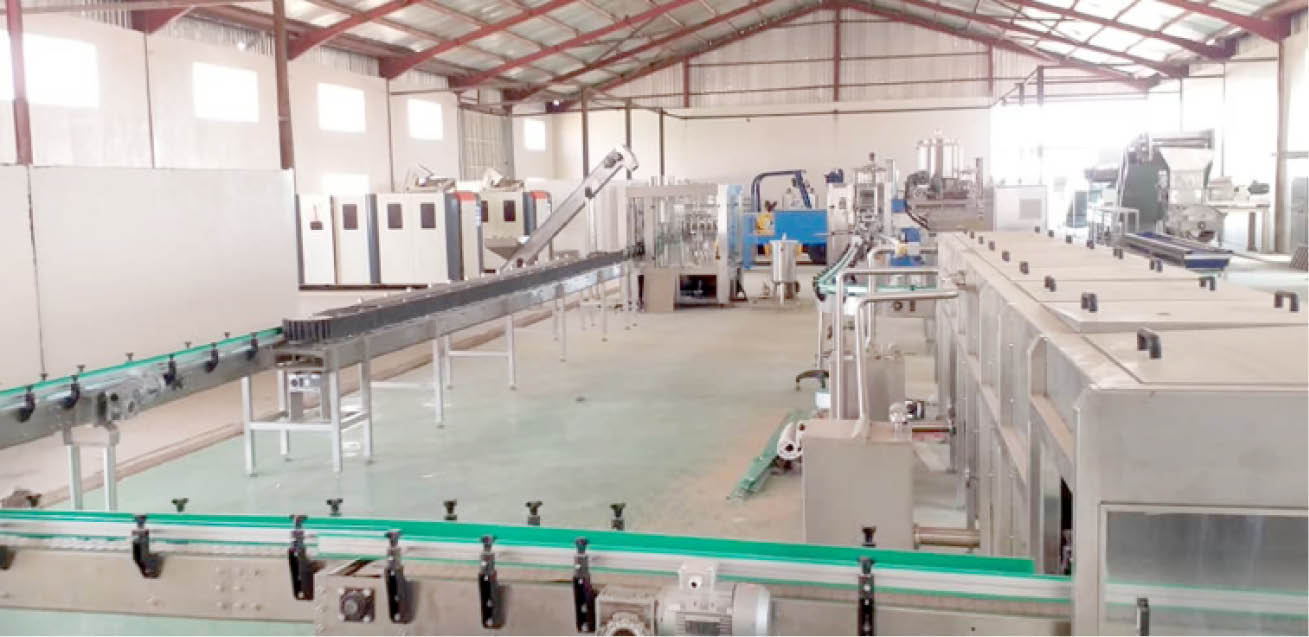Borno State’s economy has taken a massive hammering from the Boko Haram insurgency over the years. In an attempt to bounce back, an industrial hub has just been established to boost the economy, but its success is still dependent on how soon the insurgency is brought to a conclusion.
An industrial cluster has emerged at the outskirts of Maiduguri, the capital of Borno State, which, for nearly a decade, has suffered the devastation of the Boko Haram insurgency.
The Industrial Park, commissioned last April by President Muhammadu Buhari, has 16 plants for the manufacture of mostly agriculture-related products.
Although each of the plants manufactures different products, some of them are designed to share one factory hall under a modern integrated concept that ensures efficient space and resources utilisation.
The plants include a solar panels production plant with optimum capacity to annually produce panels that can generate 120 megawatts; another plant for manufacturing of elementary school desks and chairs, and a plant for the manufacturing of drip irrigation pipes.
Others include PVC pipes production plant; tomatoes processing plant; onions and ginger dehydration plant; pilot juice processing plant; cassava processing plant; table water line plant; and corn chips production plant.
The industrial hub also comprises biscuits production plant; grains and cement sacks production plant; greenhouse nets production plant, canopy shade nets production plant; and plastic mats production plant.
The cluster was designed for the localisation of factories that share resources, which include raw materials, electricity, security, amongst others. But the designs make room for the incorporation of other industries in the future.
The Kashim Shettima administration, which tenure just elapsed this May, initiated the industrial hub project as a bold and ambitious response to the economic setbacks caused by Boko Haram in the state.
Since precolonial times, Borno has been a major commercial hub and terminus, lying across the major trade routes between West Africa and the Central, East and North Africa region.
A large volume of trade between West Africa and other African regions have been conducted through Borno, with massive volumes of goods flowing from, especially the markets of Kano and other northern Nigerian commercial centres, and the Gold Coast (Ghana), to the Congos, Chad, Sudan, Egypt and the Arabia. Even in modern times, the old Kanem Empire still retains its strategic importance, which the insurgency has effected.
With Borno enjoying this enviable commercial status under the old trading system, large markets and warehouses flowered across Maiduguri, Bama and other towns around Lake Chad.
The presence of the Lake has also had huge economic relevance to the region as industries processing agricultural products and numerous other raw materials mainly sourced from and around the Kake sprang up in Maiduguri. Through this, a population of millionaires and billionaires was bred by this trading system over the decades.
University of Maiduguri’s head of the Department fo Economics, Dr Mohammed Musa affirms this.
“The Lake Chad region before the Boko Haram crisis held remarkable promise on agricultural productivity, with prodigious quantities of farm produce feeding markets and industries across the country,” he said.
That prosperity has since been interfered with by the the Boko Haram, which has hugely impacted on the socio-economic life of the people in the region.
With the success of curtailing the insurgent group to a section of the state through military success in recent times, attempts to kick- start the economy of the state have been gaining momentum and the industrial hub is one of the most important efforts in this direction.
The Industrial Park stands out in the semiarid terrain, either poised for the reconstruction of a prosperous economy, or exposed to the devastating Boko Haram insurgency and its accompanying humanitarian crises.
But as the massive structures rose, questions rose with them. Would the park be viable in the general context of the fate of industrialisation in Nigeria, characterised by the virtual lack of the requirements for the operation of a thriving industrial plant?
“Most of the 16 plants of the cluster are agro-allied, which means they will depend wholly on agricultural products that can be sourced from the farming communities around. This, by and large, implies there has to be sufficient security for the farming communities to undertake the agricultural activities that will guarantee enough raw materials for the industries to process, and security along all the roads leading to the industrial hub and its adjoining markets,” Dr. Musa said.
“Majority of the farmers have now been chased to IDP camps, and even those back in their home communities face the danger of the insurgents killing them and carting away their produce, and even setting the farms and crops ablaze,” noting, “so security has to be provided for farmers and their farms.”
How much agricultural products can it source from the Savannah region of Southern Borno and the Lake Chad region now devastated, with majority of the farmers and livestock rearers chased out of their farming communities into displaced persons camp in Maiduguri and other places by the violence?
For the farming communities contribute to the economic revival of the state and the success of the industrial parks, they would need guarantees of safety if they are to return to their villages. Recently, the Emir of Gwoza, Mohammed Shehu-Timta who recently returned to his throne five years after Boko Haram displaced him, said farmers in his kingdom have come under attack from insurgents.
Reports like this pose a threat to the success of the park, coupled with the fact that these communities have been devastated from the attacks and the insurgents have taken huge sections of the population into slavery.

Those who have the courage to return to the farms would need guarantees of their produce being procured for the industrial park.
Similarly, the park stands the chance of employing the huge population of youth in the state, especially those who have been in the civilian JTF who have been helping in combating insurgency and would be in need of employment once the fight is over.
The new Babagana Zulum-led administration in the state has so far shown the same commitment to tackling the insurgency as the previous administration. This can only be good for the fate of the park and the population of the state.
It has scaled up support for the Civilian JTF and the Hunters Association to work in a synergy with the military in combating the Boko Haram insurgency and secure farming communities for their business to resume.
One important aspect of this is the opening of roads linking this communities and the markets, especially all roads leading in and out of the state capital, Maiduguri. This would not only restore confidence but also boost intra and interstate trade as it would make for easier movement of produce.
The new government has shown further commitment to the restoration of farming and other economic activities by distributing seeds and other agricultural inputs to thousands of the IDPs for the 2019 planting season.

Stakeholders in the North-East humanitarian crisis have unanimously praised the region’s population for their resilience over the last 10 years.
Very skeletal military escort-free commuting along some routes have commenced. The risk in this commutes, mainly in the central senatorial district, are high. With insurgents still roaming the wilds, through which these roads pass, the chances of their disrupting economic activities are still substantial.
“Security is key because it provides the requisite environment for every human venture to start up and thrive,” Dr. Musa of the University of Maiduguri said.
Once the routes and the producers of the raw material are secured, other key components of the success of the hub will have to be considered. Dr. Musa enumerates some of them.
“Viability of the hub will depend on how well its operators are committed to building and maintaining the infrastructure for optimum performance.
“This is followed by such key requirements as sufficient electricity, water supply and safe transportation for the raw materials to the industries and the manufactured products to the markets.
“Then follows the recruitment of workers right from those engaged in the actual production to those engaged throughout the marketing chain; then we talk of support in terms of sufficient funding by the investors; and then taxation, which has to be affordable for the industries to pay.”
Alhaji Ahmed Ashemi, president of the Borno State Chamber of Commerce, Industry, Mines and Agriculture (BOCCIMA), viewed the industrial cluster from the perspective of revamping trans-border trade and youth employment.
“I am gladdened by the industrial park having the prospects of reviving trade between Borno and the East and Central Africa with the massive flow of goods produced in its plants to those regions,” he said.
He too is concerned about security as he thinks it is key in the success of the hub.
“This will, however, depend on security for the trans-border traders against Boko Haram onslaught,” he said, stressing, “There has to be security.”
But beyond this, he sees prospect for employment of the youth in the state.

“Some of the industries in the cluster are labour-intensive, so they should be able to employ hundreds of thousands of youth, a massive population of whom were recruited by Boko Haram.”
There is a huge number of youth to draw from, as according to Comrade Yusuf Ibn Tom, the chairman of the Borno State wing of the National Youth Council of Nigeria (NYCN), there are about two million youths in the state currently, 70 per cent of them, skilled and unskilled, are unemployed.
“Sequel to the insurgency, about 60 per cent of the youths hitherto empoyed have lost their employment,” Ibn Tom said.
Ashemi stresses that this is a pool the state government should deep into to put the hub into productive use.
“While resuscitating the economy of Borno and the North-East, these industries should, most significantly, employ the millions of idle youths, even if to distance them from enticement and recruitment by Boko Haram and reorient them from the life of crime, drug and substance abuse.”
He said the provision of employment to as large a population as the availability of resources guarantee is one of the key indices of the resuscitation and strength of the economy.
The industrialist advised: “The government that established this cluster must ensure that right from the onset the industries commence operation on a sound footing by ensuring that civil servants hands off the industries because industries are not government parastatals.”
Amongs the tips he offered are suggestions that government must appoint boards of directors comprising reputable people in the operation and management of industries for optimum results.
“This Board of Directors should manage these industries without any interference whatsoever from the government so that the government can hold them responsible in the event of failure.”
He fears that if the government makes the mistake of leaving these industries in the hands of civil servants as parastatals managed by a ministry, they will be dead on arrival.
Time will tell whether Borno’s industrial cluster will start up and grow to rebuild its once prosperous economy, either in a Boko Haram-vanquished era or floundering in the tempestuous sea of the insurgency and the humanitarian crisis it has birthed.

 Join Daily Trust WhatsApp Community For Quick Access To News and Happenings Around You.
Join Daily Trust WhatsApp Community For Quick Access To News and Happenings Around You.


